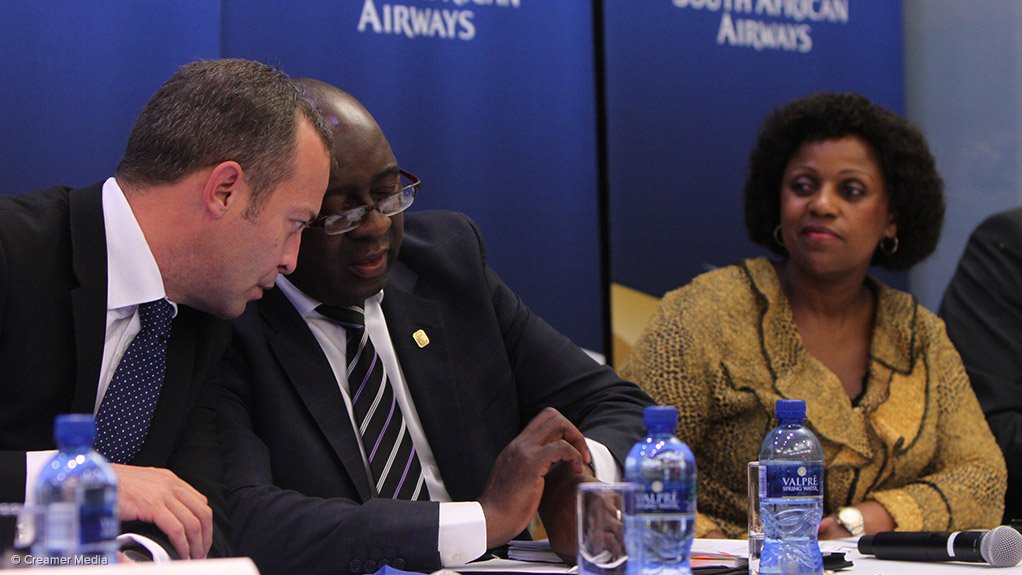Finance Minister Nhlanhla Nene has assured that loss-making national carrier South African Airways (SAA) will not receive another bailout from government, noting that the most recent R6.4-billion government guarantee had only been provided in support of an intensive 90-day “action plan”, instigated in November, to return the airline to financial self-sustainability.
It was revealed at the release of the airline’s results for the 2014 financial year, on Friday, that the State had provided it with guarantees worth some R14.4-billion since 2009 and that SAA had since used this collateral to obtain debt funding worth some R8.35-billion.
“Over the medium term, any funding of State-owned companies [including SAA] or further government support [in the form of guarantees] will be contingent on the implementation of sound restructuring and business plans with strong government oversight.
“The [most recent] guarantee for SAA by government is not a recapitalisation …there will be no recapitalisation of [the airline]. If this does happen, it will be through the sale of noncore State assets and will be budget-neutral,” he commented.
Nene said government’s recently introduced framework for the funding of State-owned companies (SoCs) dictated that it would be raised in a way that had no effect on the budget deficit and could involve the sale of property, government shareholdings in listed firms, nonstrategic government shareholdings in SoCs and surplus cash balances in public entities.
Private investment to strengthen the balance sheets of SoCs would also be explored.
“The funding framework will distinguish purely commercial activities from the costs of exercising developmental mandates. Given fiscal constraints over the next two years, recapitalisation will not be drawn from tax revenue or added to the debt of national government.
“Government policy remains that State-owned enterprises should operate on the strength of their balance sheets,” he asserted.
The Minister added that SAA’s continued losses had resulted in government adopting the “business unusual” approach to stabilise and contain the airline’s “financial bleeding”.
The subsequent introduction of the 90-day “action plan”, which was premised on SAA’s Long-term Turnaround Strategy and was now the responsibility of acting CEO Nico Bezuidenhout, had placed emphasis on executing “quick-wins”, including route closures and revenue initiatives.
“That said, it will take time for the benefits to show on SAA’s bottom line. For example, the route withdrawals will only take effect from February or March.
“The R6.4-billion guarantee was issued on the basis that the plan is robust and provides firm deliverables. For example, SAA must produce yearly savings of about R1.3-billion,” he outlined.
Elaborating on the intensive three-month turnaround strategy, Bezuidenhout said the airline, in partnership with its new shareholder Ministry, had already taken the decision to cancel the loss-making Johannesburg to Beijing, China, route.
From April 1, this route, which had accumulated losses of some R1-billion a year, would be operated by Star Alliance partner China Air.
Other routes currently under review included direct SAA flights between Johannesburg and New York, Washington, Mumbai and Senegal.
The airline was also investigating the possibility of diverting capacity from the domestic routes within South Africa to elsewhere on the continent and was also in “sensitive” talks with aeroplane manufacturer Airbus around the possible restructuring of contracts related the carrier’s new fleet of A320s.
SAA was also attempting to renegotiate its various aircraft leases and was undergoing due diligence around its “legal risk and exposure”.
“[The bottom line is], on March 24, if all the deliverables of the 90-plan are not achieved, I will be fired. We will be holding people accountable and I expect to be held accountable for the plan,” he remarked.
SAA was currently delivering a weekly progress report to Nene and Deputy President Cyril Ramaphosa, who was providing oversight to energy utility Eskom, the South African Post Office and the national carrier.
SAA widened its loss for the year ended March 31, 2014, by a hefty 100% to R2.5-billion, while total operating costs rose 11% over the period to R30.64-billion and impairments increased 100% to R1.37-billion.
EMAIL THIS ARTICLE SAVE THIS ARTICLE
To subscribe email subscriptions@creamermedia.co.za or click here
To advertise email advertising@creamermedia.co.za or click here











